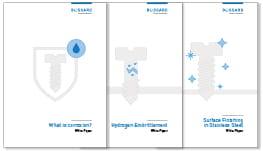Corrosion is caused by various environmental influences, can damage your product components’ surfaces and can therefore put the safety of your products at risk. Find out which components should be tested for corrosion and what types of corrosion tests are available.
Corrosion analysis in the laboratory – for safe, longer-lasting components
Environmental influences such as rain, humidity, exhaust gases or aerosols can affect the components in your products over time. Corrosion occurs when these environmental substances attack and damage the surface of the components or fasteners in your products.
This is why we recommend having regular corrosion tests performed in an accredited testing laboratory to ensure your products’ quality. During this process, you obtain reproducible test results that help you to find weak points in corrosion protection, that give you indications for measures against corrosion that has already occurred and, in the end, increase your products’ safety.
What is corrosion and what types of corrosion are there?
Often, corrosion is commonly referred to as “patina” or “rust”, which is formed by iron oxidizing in the presence of oxygen. But, from a technical standpoint, corrosion is far more diverse than that. It is a metallic material’s (electro-)chemical reaction with its environment. The result is a measurable change in the material, which can lead to individual components or entire systems no longer working properly. Depending on where it occurs, a distinction is made between different types of corrosion:
- Uniform or surface corrosion
- Crevice corrosion in small openings and recesses
- Galvanic corrosion between two types of metal
- Pitting corrosion, through the likes of pores in the coating material
- Intergranular corrosion, caused by high temperatures during metal processing
- Stress corrosion cracking, promoted by tensile stress
- Hydrogen embrittlement, caused by hydrogen penetration during acid cleaning or galvanization of steel and corrosion
So that engineers can avoid or effectively protect against corrosion at the design stage, they should be familiar with the different types of corrosion. Detailed information about corrosion can be found in our free white paper entitled “What is corrosion?” and in our technical information on “Corrosion protection”.
Corrosion testing 101
During a corrosion test, coatings of components or the corrosion protection of coated test specimens are tested with the aim of finding any defects. Long-term testing performed over the entire service life is both costly and time-consuming. To obtain comparable results more quickly, standardized tests are carried out in the testing laboratory under corrosive conditions.
- One of the best-known methods is the neutral salt spray (NSS) test in accordance with ISO 9227. During this test, we spray the test object in a test chamber with a salt solution (NaCl) for a specified period of time – sometimes more than 1,000 hours. To ensure that the test method provides reproducible and comparable results relating to your component’s corrosion resistance at all times, we set up all the tests in a uniform manner and strictly adhere to the general conditions in accordance with ISO 9227.
- Another test method that is not used quite as often is what is known as the “AT or AHT condensation water test” in accordance with ISO 6270-2. During this process, we expose a test object to humid air, then change either the air temperature (AT) or the air humidity and temperature (AHT) to cause condensation.
In addition to these two test methods, a wide variety of other corrosion tests exist. One example is the Kesternich test, where the test object is exposed to sulfur dioxide. There are also corrosion tests that are performed for industries like the automotive sector – they are developed and performed according to industry-specific requirements.
Bossard – an expert with its very own testing laboratory for conducting corrosion tests
As a specialist in fastening and materials technology that has acquired years of experience, Bossard will be happy to advise you when it comes to testing your components for corrosion. On request and as needed, we can perform NSS testing in accordance with ISO 9227 for you in our testing laboratories.
Bossard has ISO 17025-accredited testing laboratories all over the world, that use a certified quality management system in accordance with ISO 9001:2015 and employ experienced specialists who will be happy to advise you on corrosion testing and assist you with their extensive expertise.
Contact our experts and learn more about Bossard's Expert Test Services. We are happy to hear from you!
Discover other modules that contribute to improving your productivity step by step
![]() Expert Education
Expert Education
Learn about the essentials and secrets of fastenings in our seminars and e-learning courses
![]() Expert Teardown
Expert Teardown
Identify the best fastening solution and cost saving potential for you
![]() Expert Design
Expert Design
Design your best product with a wide range of technical information and tools
Expert Walk
Study your fasteners and tools in use, we determine how to proceed leaner and smarter
![]() Expert Assortment Analysis
Expert Assortment Analysis
Reduce TCO by identifying opportunities for fastener rationalization


